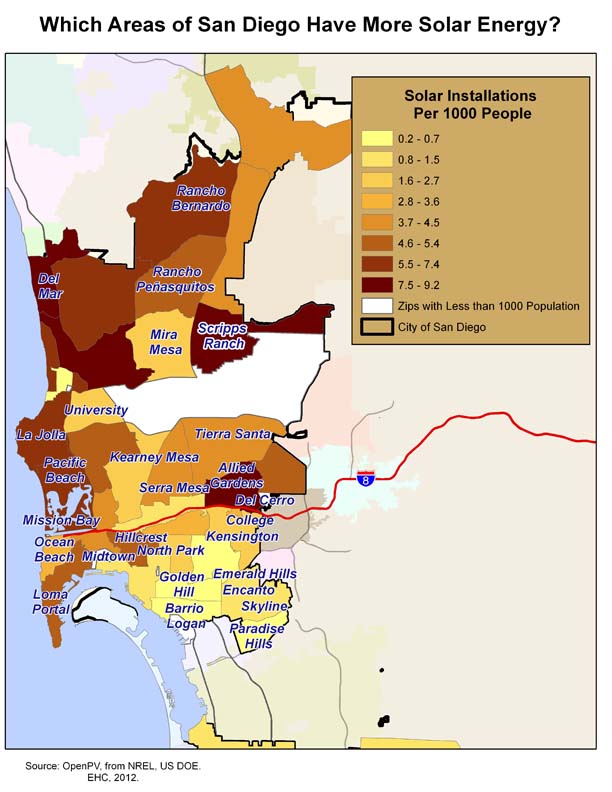 I live in a condo in La Jolla and see solar installations sprinkled around my neighborhood. That's a good thing.
I live in a condo in La Jolla and see solar installations sprinkled around my neighborhood. That's a good thing.
What would be better? If I looked around and saw solar on every rooftop in La Jolla— including my own— and in every neighborhood. That vision is both possible and feasible.
But despite the fact that costs are going down exponentially every year, new data from the National Renewable Energy Laboratory (NREL) shows that San Diego County is using less than 3% of the solar potential SDG&E estimates is possible.
What's worse is that on my bike ride down the coast to work, I see less and less solar as I glide through Pacific Beach, Mission Beach, and Downtown. And by the time I get to Barrio Logan and then my office in National City, I don't see any solar.
The NREL data shows that my eyes are not deceiving me and the green divide is very much a real thing. Low-income, highly polluted neighborhoods like Barrio Logan, Sherman Heights, and National City have very little solar compared to wealthier neighborhoods like La Jolla and Rancho Bernardo. In fact, La Jolla has nearly 4 times as many solar installations and over 2 times the solar kilowatts as Barrio Logan, National City, and Sherman Heights COMBINED. Rancho Bernardo has nearly 7 times as many installations and 2.4 times the kW capacity as Barrio Logan, National City, and Sherman Heights combined.
Don't believe me? See for yourself by exploring The Open PV Project website.
We don't need to let our clean air, climate, health, and economy be threatened any longer by existing or new expensive dirty power plants like the ones recently proposed near University City and Mission Trails—which were supported by our own, purportedly "smart" utility, SDG&E.
There is huge untapped potential in San Diego's low-income neighborhoods, especially on commercial rooftops, and there's even still potential for more solar in La Jolla and Rancho Bernardo. We have the technical potential to meet the County's peak energy demand using just rooftop solar, according to study co-authored by SDG&E.
So what are we waiting for, San Diego? It's time for energy independence.
-Kayla Race
IMAGE CAPTION: A visual display of the solar divide: The region's highest-income areas like La Jolla, Rancho Bernardo, and Scripps Ranch, and the City of Del Mar pop out in dark red, indicating the highest numbers of solar installations per capita. Lower-income neighborhoods in the City of San Diego, like Barrio Logan, Sherman Heights, and City Heights, are left in the dust with light yellow indicating their dismal number of solar installation. Click on the image to get a full-sized image.

